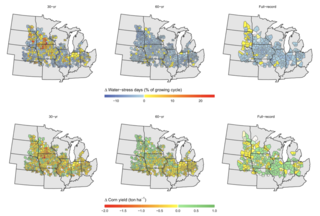Planning for crop water needs under changing climate conditions

Under current Midwest warming trends, models predict stable crop yields without need for more irrigation
The Science
As the climate warms, many scientists and farmers have worried about how rising temperatures will affect agricultural systems and crop yields. Warmer air may increase evaporation and water loss from plants, leading to concerns that climate change will cause crops to require more water—either from precipitation or irrigation—in a warmer future. However, a modeling study using temperature trends projected through 2050 suggests that future yields of corn and other bioenergy crops in the Midwest may stay stable without need for expanded irrigation.
The Impact
Most crops grown in the Midwest rely solely on rainfall; if rainfall does not increase as the climate warms, crop yield would drop due to higher water demand by plants. Meeting an increased water need would require a significant expansion of irrigation infrastructure, at great cost to farmers. Planning for a future in which bioenergy crops are used to meet some of society’s demand for fuels and chemicals requires a good understanding of how crop growth and needs, including water, will change as the climate changes.
Summary
Since warmer temperatures generally lead to more evaporation, forecasted climate changes in major crop-growing regions such as the U.S. Midwest have raised concerns that it will get harder to maintain needed yields without large increases in precipitation or irrigation. Basso and colleagues looked at long-term historical summer temperature changes in the Midwest based on observations recorded at 1,356 weather stations, some dating back as far as 1894. They found that average warming in the region has been driven by increases in minimum temperature, while maximum temperature has slightly decreased. These trends resulted in a slight reduction in water demand by crops because of higher air humidity.
The team also used a crop simulation model to predict the changes in corn yield in 2050 using the temperature and precipitation trends of the past 125 years. The results show little change in either crop water demands or yields in the next 30 years, despite the warming climate. The findings should allay concerns about crop water needs in the Midwest due to climate change based on current models. However, the authors note that annual variability in temperatures and precipitation may lead to years with unusually high or low water demand or crop yields.
Program Manager
N. Kent Peters
Program Manager, Office of Biological and Environmental Research
kent.peters@science.doe.gov, 301-903-5549
Corresponding Author
Bruno Basso
Michigan State University
basso@msu.edu
Funding
This research was supported in part by the Agriculture and Food Research Initiative – Education and Workforce Development program from the US Department of Agriculture National Institute of Food and Agriculture award numbers: 2019-67012-29595, 2017-67013-26257 and 2018-67003-27406 and by the Great Lakes Bioenergy Research Center, US Department of Energy, Office of Science, Office of Biological and Environmental Research under award numbers DE-SC0018409 and DE-FC02-07ER64494.
Publication
Basso, B., Martinez-Feria, R.A., Rill, L., and Ritchie, J.T., “Contrasting long-term temperature trends reveal minor changes in projected potential evapotranspiration in the US Midwest.” Nature Communications 12, 1476 (2021). [DOI: 10.1038/s41467-021-21763-7]
Related Link